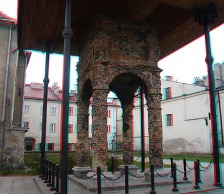Jewish Life in Tarnów, Poland Before the Shoah
As recalled by my parents Salomon and Tosia Lederberger
Pictured above: The City Synagogue, capable of holding some 10,000 people (the largest synagogue in Galicia). As its completion (c. 1910) coincided with an anniversary celebration for Austrian emperor Franz Josef, it was also known as the “Franz Josef Synagogue.”
I, Felicia Lederberger-Graber was born in Tarnów, Poland, in March 1940, a few months after the German occupation. Thus, I do not remember “the life before,” but I am extremely fortunate that not only did I survive but so did my parents. Throughout my growing-up years they talked nostalgically about our families and Jewish life in Tarnów.
Tarnów is a small town about 40 miles east of Kraków in southeastern Poland, known as Galicia. In 1939, the Jews numbered 25,000, or about 45% of the population. The majority of the stores in Tarnów were owned by Jews. The Poles were mostly farmers, railroad workers and laborers.
My paternal great-grandfather, Yosel Lederberger, lived in Brzesko, another small town between Kraków and Tarnów with a large Jewish population. Yosel Ledeberger was employed in a brewery. His wife, my great-grandmother, sold cloth in the marketplace. They had three children, one daughter and two sons. One son, Leib Israel, born there in 1882, was my grandfather.
Yosel started working at the age of 10 as a toll collector. His job was to collect fees from farmers at road junctions. Very often, he was horse-whipped by some who tried to avoid paying the fees which were used to maintain the roads.
As a young man, Leib Israel worked as a peddler traveling throughout Germany. While there, he acquired great appreciation and respect for German culture and people. This experience made it very difficult for him to believe stories circulating in the late 1930s about German atrocities. He maintained that it was impossible for these cultured Germans to act in such a brutal manner. He avowed that people were spreading lies.
After traveling in Germany for a few years, Leib Israel returned to Brzesko and married my grandmother, Sarah Rosenzweig. She was born in Cologne, Germany, one of 11 children whose family also originated from the same area in Galicia.
In Brzesko, Leib Israel learned watchmaking and then moved to Zabno with his wife where their two sons and one daughter were born. Their older son and second child, Salomon, my father, was born on August 30, 1909.
During World War I, the family moved to Tarnów. With a larger Jewish community, it was perceived as being a safer environment. There, my grandfather opened a watch and jewelry store on Krakowska Street 4. This was the town’s main street, and he became relatively successful.
Leib Israel was a Chassid, probably a follower of the Bobover Rebbe. On Shabbos, he wore a Stramel (a fur hat) and a silk bekeshe (long coat), and every morning he went to the mikvah, (ritual bath). In the winter, when it snowed, he used to wake up my father early in the morning. They would rub their bodies with the fresh snow. I heard that this was a tradition among some Chassidim. My father attributed his good health throughout his life to this ritual.
Father often recollected that growing up in Tarnów was not pleasant for Jewish boys. They were harassed in school by the other students with the encouragement of the instructors. The boys had to fight to defend themselves. Teachers never addressed the Jewish students by name but referred to them as “Jew boy in the first row” whenever he/she called on one of them.
Father’s Jewish education took place in the Cheder where he received a very comprehensive and intensive training. Even in his senior years he still remembered the davening (prayers) by heart and could conduct the Passover Seder without the help of a Haggadah.
He left school soon after his Bar Mitzvah, became a goldsmith and worked with my grandfather in the store repairing watches and designing jewelry. As both Jews and non-Jews were very poor, they sold much on credit.
I remember my father telling this story that illustrated the extent of poverty in Tarnów: A Jewish man came into the store one Friday afternoon and very shyly asked my grandfather for a loan. That man was already indebted to my grandfather, but he did not have any money to buy food for Shabbos. My grandfather gladly gave him the “loan,” knowing the man might never be able to repay him.
Every year, before Rosh Hashanah, the shames (sexton) walked throughout the streets of the Jewish neighborhoods at 3 or 4 o’clock in the morning. He rang a bell while shouting, “Wake up Jews, time to go to shul (synagogue) to say Selichos (penitential prayers).”
Before every Yom Tov (Jewish Holiday), Grandfather went to see the Rebbe. Once, he took my father along, a visit which made a lasting impression on him. Father loved to retell how hundreds of Chassidim would assemble at the Rebbe’s tisch (table). The Rebbe would be served dish after dish. He would take one mouthful, then pass it on to his followers who literary fought for the privilege of eating some of the Rebbe’s sherayim (leftovers).
My mother was born in Tarnów, also one of three children, and her parents were just as frum (religious) as my father’s. The family owned a small grocery store and was very poor. My grandmother had to wait until the last minute before Shabbos to be able to get enough money to buy food. But she always made sure to have an extra challah for an even poorer woman who came begging every Friday afternoon. She also often traveled to see the Rebbe, especially on Rosh Hodesh (the new month).
My parents followed the trend of the young generation of their days: they were ardent Zionists and members of Hashomer Hatzair (a Jewish Zionistic Scout movement). My mother’s dream to make aliyah (move to Palestine) was briefly realized when she joined the Youth Aliyah in 1933. She went to Nachalal, an agricultural school in Galil (Galilee), with plans to join a kibbutz after graduation.
Life, however, had other plans for her. In 1934, my grandmother became gravely ill. Mother went back to Poland and nursed her until her death a few months later. Shortly afterwards, her sister, Adele, died in childbirth. The double blow hit her and her brother hard – she did not go back to Palestine. She got a job, and in March 1939, married my father – just six months prior to the German invasion.
And life changed forever.

The story continues in Amazing Journey: Metamorphosis of a Hidden Child.
Please leave your comments below.
Read more by Felicia Graber.

